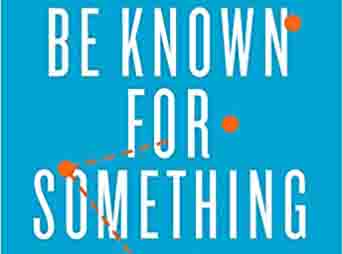Be Known for Something: Reconnect with Community by Revitalizing Your Church’s Reputation
Books & Guides
The Rev’d Mark Vincent of St Paul’s Anglican Church, East Brisbane reviews the book Be Known for Something, which suggests practical ways of drawing people to your church

The decline in church attendance across many denominations continues to be a problem, especially in terms of the ongoing financial sustainability of many churches. The Barna Group estimates that 43 per cent of millennials currently attending established churches will drop out in the next decade.
In Be known for Something, Mark MacDonald provides an approach to attracting people to your church that deserves consideration. Not surprisingly, he attributes the decline in church attendance to the number of choices now available for people to fill in their time on Sundays. In essence MacDonald is saying people need to have a reason to attend a church and he argues that people are looking for solutions to meet their most predominant needs, but by and large churches fail to communicate how they can meet those most pressing needs. What is most alarming is Macdonald’s observation that when a sample of unchurched people was asked about the relevance of church, fully one-third had no idea of how belonging to a congregation could be of benefit for them.
Advertisement
He contends that audiences want to weigh up the pros and cons of attending church, but have not got the time to figure out the details of what a church offers. Consequently, churches need to be known for a solution that is pertinent to issues that are predominant in people’s lives. Because of the vast array of options on offer, individual churches will make decision-making easier by being known for something.
However, being known for something is hard to control, but if we don’t control what we are to be known for, the people around us will control it and that, of course, is what we call perception. In other words, who you are as a church is not necessarily what you are known for. MacDonald suggests that Jesus knew very well how to clear up perception: tell something truthful that makes sense to the audience, and communicating it over and over at the right times.
To influence an audience, we need them to choose us for something and MacDonald suggests that that something can be encapsulated in what he calls a thread. Basically a thread is a short statement that encapsulates the core benefit/s (based on features) that your church provides. In marketing parlance, a thread is essentially a tagline and in the secular world ‘Just do it’ and ‘Oh what a feeling’ spring to mind. Church examples include ‘Life.Together’, ‘More Life’ ‘We build hope’.
Advertisement
While the concept of the thread underpins much of the discussion, the book covers the whole gamut of church communications. It could be considered a relatively standard marketing book and, even though MacDonald attended a seminary and is deeply involved in discipleship at his own church, he himself states: “I am not fully satisfied with how I balance secular marketing with church marketing.” The fact that he is conscious of this tension means that the approach to the topic is more nuanced than is the case for most books that cover church marketing. The book is comprehensive in its coverage of key concepts, and practical in that it provides easy-to-follow, step-by-step instructions throughout. The examples of threads and marketing strategies are helpful, but MacDonald wisely warns against the temptation to imitate. One useful starting point which I have undertaken already is to ask parishioners to complete the sentence, ‘I attend this church because I….’ In this exercise alone, I have started to identify the core elements of our church’s potential thread.
What is most useful are the chapters designed to assist churches in developing an online presence with many tips and observations that will be helpful to those who don’t want things to ‘fall through the cracks.’ Further resources are available through the Be Known For Something website.
Each chapter also contains discussion points which could be useful for Parish Councils to ponder from time to time. In keeping with Eugene Ionesco’s observation that ‘it is not the answer that enlightens but the question’, here are ten such questions to start your thinking.
- Have we lost connection with our community? Or even our congregation?
- If someone was randomly asked in our community to name a great church, would we be on the list? Who else would be there? Why?
- What are we known for in the community?
- Are we truly content with what we are known for? If not, what would we like to be known for? Think about what our community needs.
- What solution(s) are we (and our church) needed for? Is there a correlation between what we are known for and the solutions we provide?
- What’s the biggest benefit from attending our church? What would the regular attendee say it is?
- Are we truly content with what we are known for? What needs to change soon? What can be a goal date for accomplishing these changes?
- Are there regular themes that establish a thread? Or have there been too many changes within our communications that no one would be able to identify it?
- Is there any consistent thread about who we currently are?
- Having developed a thread, is it fairly easy to make the shift toward talking about Jesus from your thread? In other words, if someone knows us for a solution, how can we link that to the Gospel story? The closer the link, the easier it will be to be known for Jesus.
Mark MacDonald, 2017. Be Known for Something: Reconnect with Community by Revitalizing Your Church’s Reputation. High Bridge Books, Houston.






